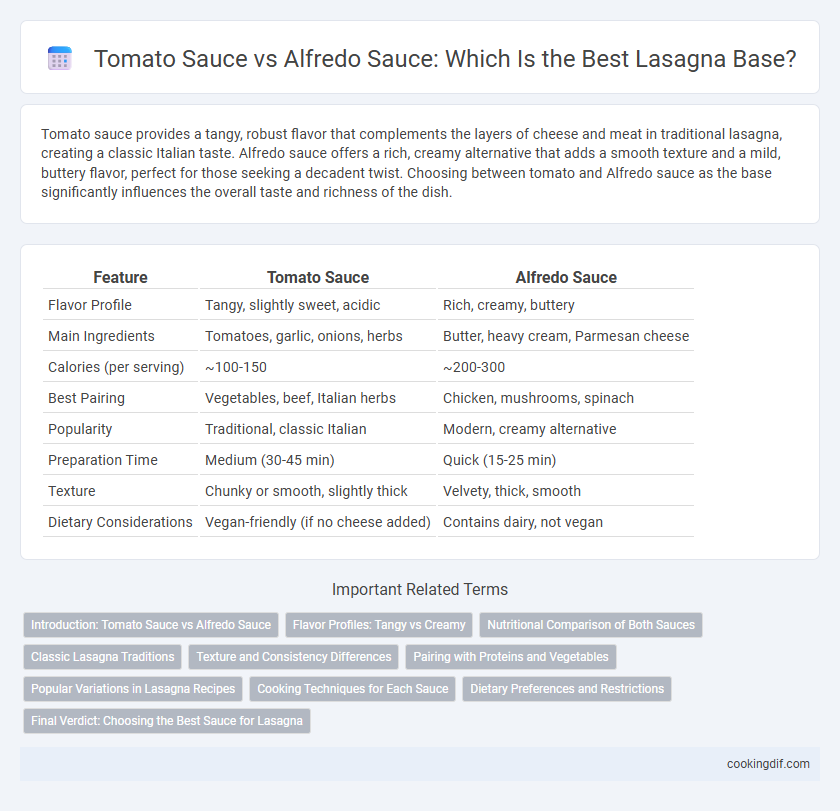Tomato sauce provides a tangy, robust flavor that complements the layers of cheese and meat in traditional lasagna, creating a classic Italian taste. Alfredo sauce offers a rich, creamy alternative that adds a smooth texture and a mild, buttery flavor, perfect for those seeking a decadent twist. Choosing between tomato and Alfredo sauce as the base significantly influences the overall taste and richness of the dish.
Table of Comparison
| Feature | Tomato Sauce | Alfredo Sauce |
|---|---|---|
| Flavor Profile | Tangy, slightly sweet, acidic | Rich, creamy, buttery |
| Main Ingredients | Tomatoes, garlic, onions, herbs | Butter, heavy cream, Parmesan cheese |
| Calories (per serving) | ~100-150 | ~200-300 |
| Best Pairing | Vegetables, beef, Italian herbs | Chicken, mushrooms, spinach |
| Popularity | Traditional, classic Italian | Modern, creamy alternative |
| Preparation Time | Medium (30-45 min) | Quick (15-25 min) |
| Texture | Chunky or smooth, slightly thick | Velvety, thick, smooth |
| Dietary Considerations | Vegan-friendly (if no cheese added) | Contains dairy, not vegan |
Introduction: Tomato Sauce vs Alfredo Sauce
Tomato sauce provides a rich, tangy foundation with robust flavors derived from tomatoes, garlic, and herbs, enhancing the traditional Italian lasagna experience. Alfredo sauce offers a creamy, buttery alternative, contributing a smooth texture and subtle cheese notes ideal for white or chicken lasagnas. Choosing between tomato and Alfredo sauce significantly influences the dish's flavor profile, moisture content, and overall authenticity.
Flavor Profiles: Tangy vs Creamy
Tomato sauce offers a tangy, slightly acidic flavor profile with rich umami notes that complement the layers of pasta and cheese in lasagna. Alfredo sauce provides a creamy, buttery base with a smooth texture and subtle hints of garlic and Parmesan, creating a rich, indulgent experience. Choosing between these sauces depends on whether you prefer a bright, zesty taste or a velvety, savory richness in your lasagna.
Nutritional Comparison of Both Sauces
Tomato sauce in lasagna provides a rich source of vitamins A and C, antioxidants, and lower calorie content compared to Alfredo sauce, which is higher in saturated fats and calories due to its cream and butter base. Tomato sauce supports heart health and weight management, while Alfredo sauce offers higher calcium and protein levels from dairy but may contribute to increased cholesterol. Choosing between tomato and Alfredo sauce depends on nutritional goals, with tomato sauce favoring lower fat intake and Alfredo sauce supporting higher protein consumption.
Classic Lasagna Traditions
Classic lasagna traditions predominantly favor tomato sauce as the base, highlighting rich, slow-simmered flavors made from ripe San Marzano tomatoes, garlic, and fresh basil, which create a robust foundation. Alfredo sauce, made from butter, cream, and Parmesan, offers a creamy alternative but deviates from the authentic Italian recipe rooted in hearty, tangy tomato sauces that balance the richness of ricotta and mozzarella cheeses. The choice between these sauces influences the texture and flavor profile, with tomato sauce maintaining the traditional, savory essence of classic lasagna.
Texture and Consistency Differences
Tomato sauce for lasagna offers a chunky texture with a slightly acidic, robust consistency that seeps into the pasta layers, creating a rich, moist bite. Alfredo sauce provides a creamy, smooth texture and a thicker, velvety consistency that coats each layer evenly, resulting in a rich and indulgently silky mouthfeel. The choice between the two sauces significantly affects the lasagna's overall moisture balance, with tomato sauce producing a lighter, more textured dish and Alfredo sauce delivering a denser, creamier experience.
Pairing with Proteins and Vegetables
Tomato sauce in lasagna pairs excellently with hearty proteins like ground beef, Italian sausage, or chicken, complementing vegetables such as spinach, mushrooms, and bell peppers with its rich acidity. Alfredo sauce offers a creamy, milder base that enhances delicate proteins like shrimp, chicken, or turkey and blends seamlessly with vegetables like broccoli, zucchini, and peas. Choosing between tomato and Alfredo sauce depends on the desired flavor profile and the balance between robust or subtle ingredients in the dish.
Popular Variations in Lasagna Recipes
Tomato sauce, rich in tomatoes and herbs, forms the classic base for traditional Italian lasagna, offering a tangy and savory flavor profile that complements layers of ricotta and mozzarella cheese. Alfredo sauce, made from butter, cream, and Parmesan, creates a creamy, indulgent alternative often used in white lasagna recipes or to enhance vegetable and chicken variations. Popular lasagna recipes alternate between these bases, catering to diverse tastes and regional preferences, with tomato sauce favored in meat-based versions and Alfredo sauce preferred for lighter, seafood, or vegetarian lasagnas.
Cooking Techniques for Each Sauce
Tomato sauce for lasagna requires simmering crushed tomatoes with garlic, onions, and herbs over low heat to develop a rich, deep flavor and proper consistency. Alfredo sauce demands careful melting of butter combined with heavy cream and freshly grated Parmesan, whisked continuously over gentle heat to prevent curdling and achieve a silky texture. Mastering temperature control and gradual ingredient incorporation is essential for perfecting each sauce's unique cooking technique.
Dietary Preferences and Restrictions
Tomato sauce in lasagna offers a lower-calorie, vegan-friendly base rich in antioxidants like lycopene, catering to dairy-free and plant-based diets. Alfredo sauce, made with cream and butter, provides a high-fat, protein-rich option suited for ketogenic or low-carb dietary preferences but may challenge lactose-intolerant or vegan individuals. Choosing between tomato and Alfredo sauce hinges on balancing nutritional goals, such as minimizing saturated fat intake or maximizing calcium consumption.
Final Verdict: Choosing the Best Sauce for Lasagna
Tomato sauce offers a classic, tangy base rich in acidity and herbs that perfectly balances the hearty layers of meat and cheese in lasagna. Alfredo sauce provides a creamy, buttery alternative that enhances the dish with a smooth, decadent texture ideal for white or vegetable lasagnas. Choosing the best sauce depends on flavor preference and dietary needs, but tomato sauce remains the traditional favorite for its robust and well-rounded taste.
Tomato sauce vs Alfredo sauce for base Infographic

 cookingdif.com
cookingdif.com